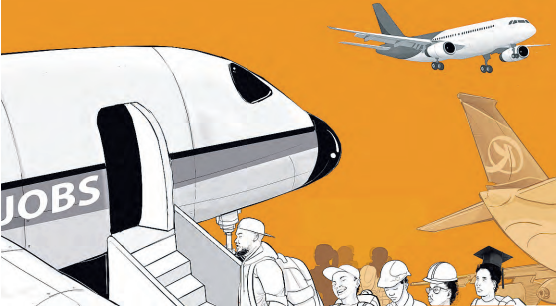
Technological advancement has enabled people to seek employment outside their home countries.
That is the reason it is increasingly becoming easier for businesses and people to extend their spheres of experience and exposure beyond their home boundaries.
There are two main pathways to expatriating for work abroad.
The first is where individuals are sent abroad by organisations that they work for.
The second way is where individuals relocate to other countries of their own volition to seek employment.
The second is the pathway used by most Kenyans.
Their main destination for employment abroad is North America, Europe and the Gulf.
Countries in the GCC-Saudi Arabia, Bahrain, UAE, Qatar, Oman and Kuwait have witnessed huge economic growth since the discovery of crude oil deposits.
Due to this rapid economic growth, these countries have largely been dependent on expatriate workers because of shortage of adequately qualified indigenous workers.
Indeed, more than 90 per cent of the workforce in some Gulf countries, for example UAE, are expatriates, who work in areas like medicine, education and finance.
Besides these, millions of expatriates work as labourers and house-helps.
As of 2024, there were over 416,000 Kenyans working in the GCC countries.
Saudi Arabia is hosting most Kenyans, approximately 310,266.
Qatar is home to about 66,025, the UAE about 23,000, Bahrain 8,000 and smaller numbers in Kuwait, Oman and Iraq.
Kenyans work in various economic sectors of these countries.
The largest proportion works in low-skilled roles, especially in domestic service.
For example, in Saudi Arabia alone, around 70 per cent of Kenyan workers are in domestic work, with others employed in education, construction, hospitality and transportation.
These Kenyan expatriates are drawn to these countries in the hope they can secure stable employment and improve their lives and that of their families.
Consequently, they send money to their loved one back home in Kenya.
While their remittances contribute significantly to Kenya’s economy, they face myriad of challenges in the host countries.
Some of the difficulties they encounter include unsafe working conditions, exploitation, limited labour protections and cultural adjustment difficulties.
Inevitably, these problems impact their well-being and mental health.
Although the Kenyan government has been trying to alleviate these problems by creating bilateral agreements to enhance worker protections, Kenyans working abroad still face many challenges.
The Kenyan government, in partnership with Gulf states, must prioritise the welfare of expatriates.
Strengthened labour agreements, regular monitoring of working conditions and accessible support services for Kenyans abroad are vital.
For instance, a 2022 bilateral labour agreement between Kenya and Saudi Arabia aimed to improve conditions for domestic workers, but implementation remains inconsistent.
Agencies facilitating employment in the Gulf must also be held accountable to ensure ethical practices.
A 2020 report revealed that 60 per cent of recruitment agencies lacked proper accreditation, leaving workers vulnerable to exploitation.
Regulation and monitoring of these agencies are critical to preventing abuse.
The Kenyan government must also embark on a programme to train expatriates before mobilisation to host countries. It is particularly imperative that the trainings are done in a one-stop setting where those expatriating are sensitised and given hands-on experience of what they could face.
Furthermore, in co-ordination with its embassies, there should be regular events where Kenyans can meet, socialise and reminisce about home.
At these events, the government should encourage entrepreneurial Kenyans to sell foods from back home, so the expatriates get a taste of back home.
Kenya’s department of Diaspora Affairs should also priorities the health and well-being of Kenyans working abroad, ‘The goose that lays the golden eggs’ should be looked after.
Being away from home in a faraway foreign land significancy contributes to mental issues.
It is therefore important that this is taken seriously and addressed.
On the domestic front, public awareness campaigns are needed to inform aspiring expatriates of their rights and the realities of working abroad.
Families must also recognise the emotional toll of separation and support their loved ones with empathy and understanding.
FARAH KALMEY
Lecturer and consultant












